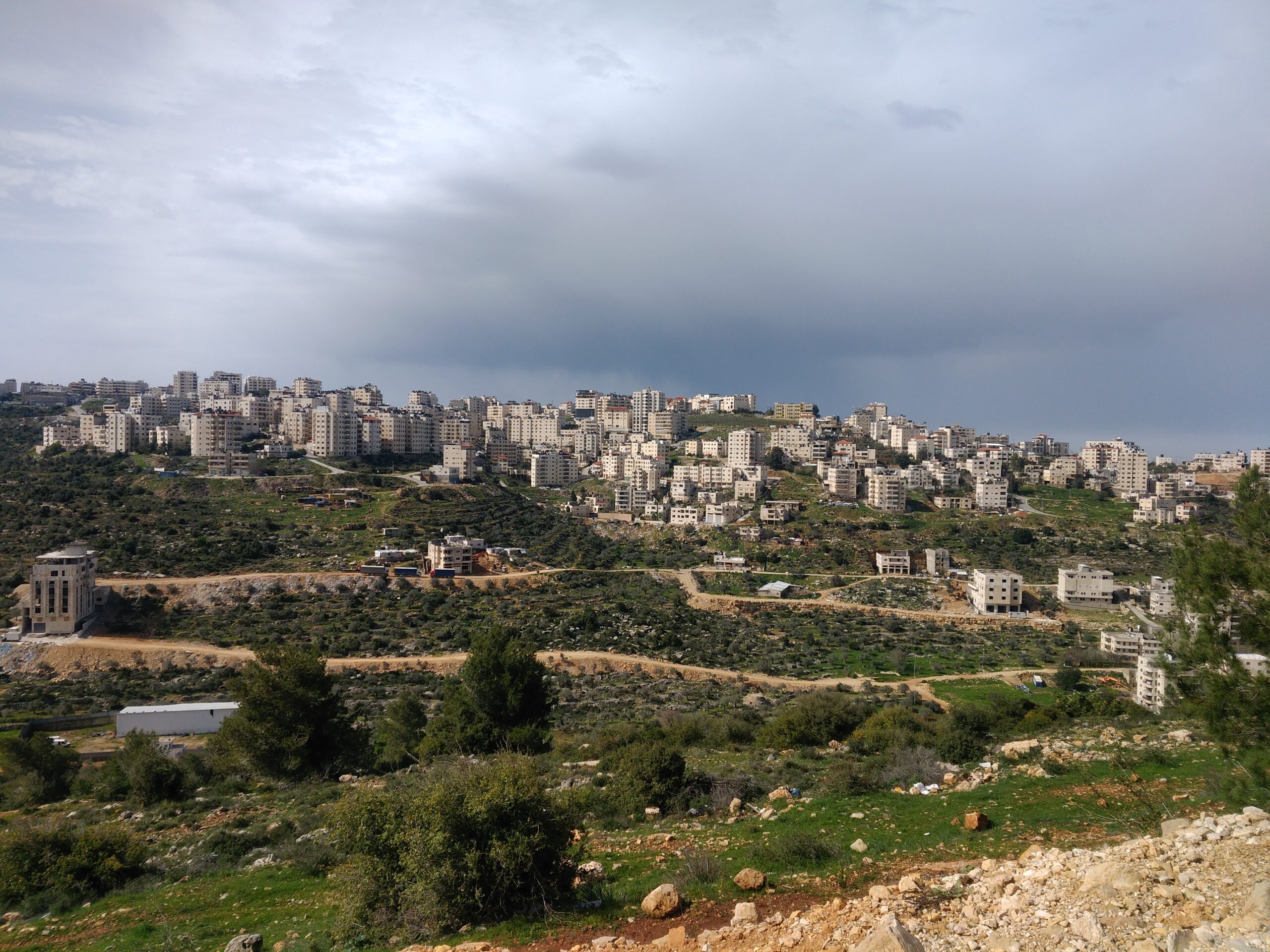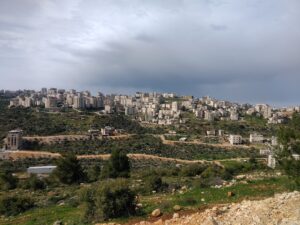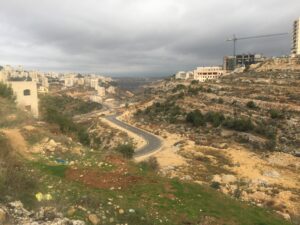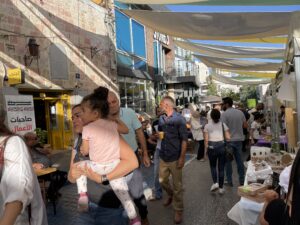After nearly a month abroad and a battle with the Israeli military over his return, my partner Osama landed at the Tel Aviv airport. I left our children with neighbors and drove to pick him up. He exited the airport wearing a mask and face shield, clearly tired. I stood two meters from him and made gestures of a hug and kiss. He smiled, put his suitcase in the trunk and sat in the back seat. I opened the windows, and we drove toward Ramallah.
“They treated us like VIPs,” he reported, when I expressed surprise at how quickly he cleared the airport. “Two security officers collected me and another three Palestinians. We didn’t have to wait in line.”
“I missed you, sweetheart,” I said. “The children also miss you.”
But at home, Osama entered mandatory travel quarantine in our bedroom, which has its own bathroom and door that opens to the garden. I brought the children to the garden and showed them Osama behind the screen door and iron gate. A huge smile spread over the face of two-and-a-half year old Adam. He grabbed the locked iron gate and tried to open it. When it remained closed, he pulled my hand.
“It’s locked, sweetheart,” I told him. Six-year old Forat tried to explain: “Baba can’t leave the room because of the virus!” But Adam was determined. He pulled me into the house, to the bedroom door, and pulled its handle hard.
I knelt beside him and spoke softly. “Sweetheart, the door is locked.”
Adam ran outside and tried the iron gate again. And then ran back inside and tried to open the other door again.
“Baba!” he screamed and burst into tears. I hugged him and thought of the additional two weeks ahead of me, still alone with the children, without daycare or summer camp or a partner to help.
The children got used to our new family routine, in which they would periodically go outside to visit their father as if he were a caged lion in a zoo. Adam would climb the iron gate outside Osama’s room and chatter away, while Forat liked to pass Osama drawings underneath the door. I put a table in the garden, outside Osama’s room, and we would eat meals there, as if together.
Osama’s attempts to schedule a coronavirus test at the Palestinian Health Ministry went nowhere. There was no answer at the phone number designated for coronavirus testing, and sending the online form yielded only error messages.
“You would have to stay in quarantine for 14 days anyway,” I told him. “Even if you got a negative test.” But both of us were concerned about the systemic failings that the lack of response indicated.
“It’s what I have always told you,” Osama said to me. “In Ramallah we have everything, but it’s hollow.”
The next day, I took the children to a sixth birthday party for Salah, Forat’s friend from kindergarten. Two other families came, and the children played on Salah’s huge balcony, on the roof of the building that looked out over olive groves. Adam raced toward the swing, and Forat and Salah ran to his room to dress up like Wonder Woman and a vampire. One of the guests, a thirty-something man, approached me and introduced himself as Omar.
“Is that your daughter?” he asked, pointing to Adam, who was wearing Forat’s pink Hello Kitty dress.
“My son,” I corrected. “He likes dresses.”
“Like my daughters,” Omar said, pointing to a baby and a girl of about four who sat next to their mother, a young woman in a flowered hijab.
Adam raced to the trampoline and jumped high.
“Ima, look!”
“I’m looking, sweetheart.”
“Ima!!”
“I’m looking, sweetheart,” but I turned away to pour myself a glass of wine. I collapsed onto the sofa.
“You’re tired?” Omar asked.
“Sorry,” I said. “My partner was abroad, now he’s in quarantine, and the daycares are still closed. I have been alone with my kids for a month, and I’m going nuts.”
“You spoke with them in Hebrew,” he said, and sat next to me.
“Yes.”
“It must be complicated, to speak Hebrew here in Ramallah,” he said. “How do people react?”
“I think that because it’s not expected, and the associations with the language are in a military context – a lot of people don’t notice that I’m speaking Hebrew.”
“Your son’s ‘Ima’ was hard to miss.” Omar examined my face. “It’s not an easy decision.”
“There’s no easy way for me to live here,” I said.
“I would imagine.”
I was surprised by his forthrightness. Sawsan, Salah’s mother, had raised the question of my identity only after we had known each other for weeks. Other friends avoided the subject unless I raised it. But Omar began to confide in me, sharing experiences with soldiers in the village where he grew up, his encounters with Israeli settlers and a conversation he had with an Israeli tourist, in the airport in Frankfurt, while he waited to board a flight to Amman, and the Israeli man waited for a flight to Tel Aviv.
“I heard him speaking Hebrew to his girlfriend – she was wearing that star on a chain – and I was really scared. But I told myself I had a rare opportunity to speak with an Israeli, and that I would be safe, because we were in Europe.”
“What did you talk about?”
“I don’t remember exactly. I wanted him to know that I was Palestinian. I wanted to talk to him without him being in a position of power over me. I’m glad I talked to him.” And then Omar continued: “People here don’t know how to separate the language from the occupation. It’s not the fault of the language, but people mostly hear it from soldiers.”
“Or at Israeli construction sites and prisons,” I said, thinking of the Hebrew lessons my partner Osama learned as a teenager and young man.
“I’m very glad to meet you,” Omar said to me. “I had to come a long way in order to be glad to meet you.”
I wanted him to say more, but Sawsan arrived with the birthday cake. While everyone sang to Salah, I looked at the view. On the horizon I could see the towers of the Israeli city of Modi’in. Such a tiny space, but few people get to travel throughout its different parts. There was a time when Ramallah was foreign to me, too – threatening and scary. I wanted to tell Omar that I have also come a long way.
This post was also published at Haaretz.com on August 17, 2020: https://www.haaretz.com/israel-news/it-must-be-complicated-to-speak-hebrew-here-in-ramallah-1.9076913



